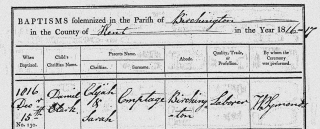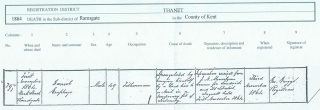Elijah Emptage was baptised in 1795 at the All Saints Parish Church, Birchington. Twenty one years later, in the same church, he married Sarah Clark, daughter of Daniel and Jane Clark. Their son Daniel Clark Emptage was born in 1816 and was followed by seven daughters.
Elijah was an agricultural labourer. Following the Swing Riots of 1830, (link to article) as farming became less labour intensive and more machinery based, Elijah and Sarah must have discussed the future for their family and taken the momentous decision to emigrate to the USA where prospects seemed better. They could become farmers and land owners rather than just agricultural labourers.
In 1835 they settled in Ohio with their surviving daughters: Eliza, Mary Ann, Sarah, Dorothy, and Elizabeth. Elijah’s brother Thomas and his family also emigrated to Ohio at the same time. Daniel, by then aged 19, remained in Birchington.
He had another three uncles still living locally: John, an agricultural labourer and William, a groom, were in Birchington and Daniel, a successful painter and decorator in Margate. So Daniel still had Emptage men in his life to offer support and guidance.
Daniel married Caroline Goldsmith from Ramsgate in 1838, when he was 21 and she was 17. They set up home at 28 York Street, Ramsgate, where Daniel was a fisherman and oyster seller.
Caroline’s father, Jarman Goldsmith was a mariner and perhaps he had helped Daniel move from his agricultural background in Birchington to become a fisherman in Ramsgate. He and his wife Frances, daughter Jane and son Jarman lived just a few doors away from Daniel and Caroline, at number 31 York Street.
Daniel and Caroline’s first child, Sarah Francis was born in 1841 but she died aged just eight months. They went on to have three more daughters, Caroline, Dorothy and another named Sarah Frances but sadly, she too died not long after birth. Their fifth daughter, Elizabeth Ann was born in 1856 and died when she was just 26 months old.
On 13 March 1860, the South Eastern Gazette, reported the case of Elizabeth Hockley who had knowingly received stolen goods, viz six pairs of shoes. She had sold them on to four women who were proved to have brought them though the report does not indicate whether they knew them to be stolen. It would seem not as, whilst Elizabeth Hockley was committed for trial, the four women were discharged. One of those women was Caroline Emptage.
In December 1860, Caroline gave birth to a son who they named Elijah Jarman Emptage, after his paternal grandfather Elijah Emptage and his maternal grandfather Jarman Goldsmith (who had died in 1855).
By April 1861 Daniel and Sarah were still living at the same address in Ramsgate, with their children Caroline, who was 16 and assisting her father, Dorothy aged 13 and was at school, and the baby, Elijah, just four months.
Within a few months a nightmare began for Daniel.
In July 1861 the Kentish Gazette reported that Daniel Emptage, a shipwright, from York Street, Ramsgate, had been arrested for breaking into the barge Sheppey, which was then lying at Sheerness, on the Isle of Sheppey. He was charged with stealing a pair of trousers and a cap, the property of the mate of the barge. At the Sittingbourne Petty Session the magistrates remanded him in custody for a week.
When the court reconvened, a warrant officer from the Royal Navy was present and identified the prisoner as Jarman Goldsmith, a seaman belonging to the revenue cutter Royal George. Jarman was committed for trial at the assizes. Whilst purporting to be Daniel Clark Emptage, he had actually given his real age, which was ten years younger than Daniel.
For the stealing of the clothes from the barge and for impersonating Daniel, he received four months imprisonment with hard labour.
So justice was done but what was the effect on Daniel and Caroline of her brother Jarman Goldsmith’s attempt to blame Daniel for his crime? Surely Daniel felt betrayed. Did Caroline feel torn between her husband and her brother? Did his reputation locally suffer and therefore his oyster selling business and their income?
On 12 September 1864 Daniel, then aged 39, found himself in the Canterbury Police Court, pleading guilty to the charge of stealing a coat at Margate. No reason was given for the theft. Daniel said that he belonged to Ramsgate and that he got his living “at the bottom of the sea”. The Court Recorder sentenced him to four months hard labour.
Initially we assumed that the sentence began immediately but that Daniel was released early for some reason as, just seven weeks later, on the morning of 1 November 1864, Daniel, aged 48, was found hanging from a beam in the cellar of his shop, 28 York Street, Ramsgate.
An inquest was held on that say. It appeared that early in the morning of that day, the deceased was discovered hanging in the cellar below the shop from a beam. He was discovered at a quarter to eight in the morning. An alarm being given, Mr Scoates a neighbour living opposite, and his apprentice, went in, the latter cut down the body which was cold, life being extinct.
The jury heard that the deceased had lately given way to dissipation – indeed, during the last week he had almost constantly drunk. Medical testimony certified the cause of death and the jury returned the following verdict, “that deceased had destroyed himself whilst in a state of temporary insanity”.
What brought Daniel to such a state that he saw no alternative but to end his life?
To recap, in 1861, his brother in-law, Jarman Goldsmith, had attempted to frame Daniel for his own crime.
In 12 September 1864, at Canterbury Police Courts, a Daniel Emptage was convicted of theft and sentence for four months hard labour.
But we have additional records which show that, on 11 October 1864, a Daniel Emptage was convicted of larceny at the Dover Quarter Sessions and sent to prison for four months.
If this was the same Daniel Emptage, we would expect to see reference in the newspaper report to the effect that Daniel was already serving time and had been brought to court from jail. And surely there would be reference to the second sentence to be run concurrently with the first or to follow on from the first?
Viewed from this distance, we have to ask ourselves whether the court cases in September and October 1864 were actually against the real Daniel Emptage or was Jarman Goldsmith again impersonating his brother in-law. Or did someone else have a grudge against Daniel?
That there were two cases in which one or two people purporting to be Daniel Emptage had been found guilty and sentenced to four years imprisonment each is undisputed.
But, very clearly, the date of Daniel’s death is not in question and his body was identified by Caroline and the neighbour. How could Daniel have hanged himself at home in Ramsgate if he was meant to be serving time in jail doing hard labour?
As was often the case in those days, the inquest was held in the town hall, on the afternoon of the day on which Daniel died. Whilst the facts of his death were not in dispute, it seems to us that it allowed very little time for any extenuating circumstances to be discovered. There was no explanation for why Daniel had suddenly given way to habits of dissipation.
If he was being impersonated in September and October, and could only expect that this was going to be repeated time and time again, and that he could see no way out of the nightmare, it would have been reason enough for him to take to drink and to have destroyed himself by reason of temporary insanity.
Daniel died aged 49, leaving his wife Caroline and their surviving children, Caroline, Dorothy and Elijah. What effect did this have on them? Did they know why Daniel took his life?
There are too many gaps for us to piece together the whole story of what happened to Daniel Clark Emptage but does seem that, on top of the death of three of his children, the events which befell Daniel were too much to handle. Whether innocent or guilty of the charges against him, it was a tragic end to his life.
Jarman Goldsmith had a long record of misdemeanours or crimes, Born in Ramsgate in 1827, he was imprisoned in 1843 and 1844 for larceny. In 1846 he received 8 months hard labour for stealing iron. In 1849 he was a mariner, fined for using obscene language and ten years later, at 32, as a mariner on HMS Royal George, he was fined for fighting. In 1860, while stationed at HMS Pembroke, Chatham, exceeded his home leave.
Following his impersonation of Daniel in 1861, Jarman Goldsmith doesn’t reappear in the court records until 1873 when, aged 46, he received 6 months hard labour for an assault on a police constable. He was described as a repulsive looking man in a sailor’s suit. Three years later he was imprisoned for ill treating a donkey. He was sentenced under the name of John Goldsmith and later discovered to be Jarman Goldsmith.
By 1879 Jarman Goldsmith had become a chimney sweep and was fined for being drunk and disorderly. He died the same year, aged 52.
It seems that Jarman was a thoroughly bad character and, having already impersonated his brother in-law in 1861, it is seems highly likely that he would have done so again, in 1864, thus continuing the nightmare for Daniel who, seeing no way to end it, drank himself into a state of insanity and killed himself.
It is a very sad story, for Daniel, Caroline and their children.
David Emptage and Susan Morris
Sources
South Eastern Gazette 13 March 1860
Kentish Gazette 23 July 1861
Kentish Gazette 30 July 1861
Kentish Gazette 11 October 1864
Kentish Gazette 8 November 1864
Kentish Gazette 12 November 1864
Kentish Chronicle 12 November 1864


